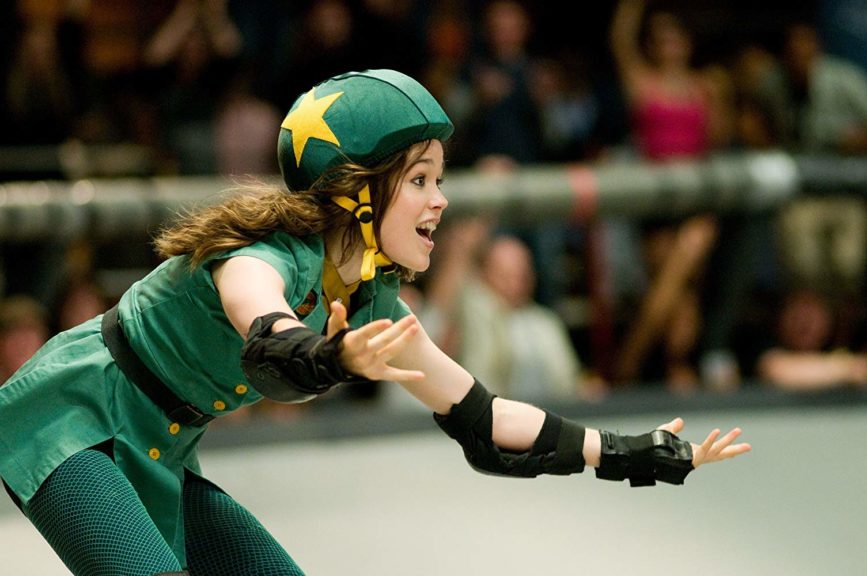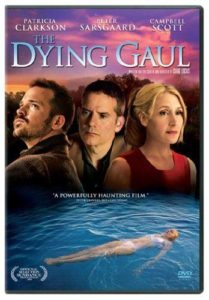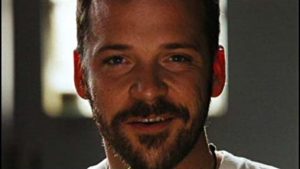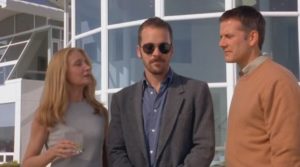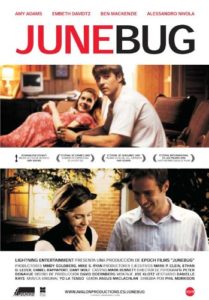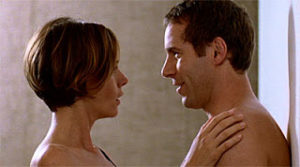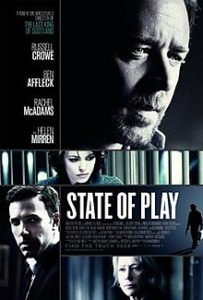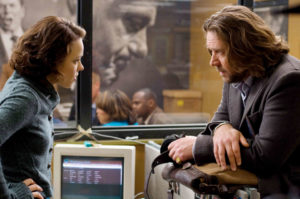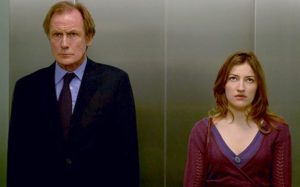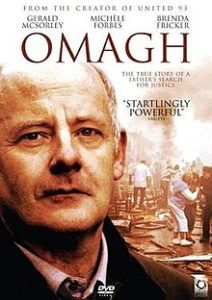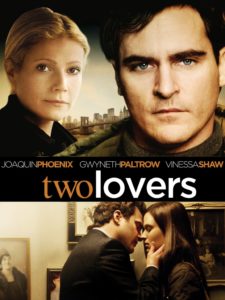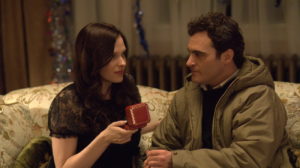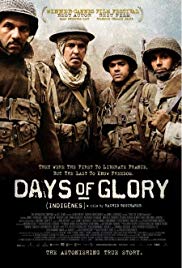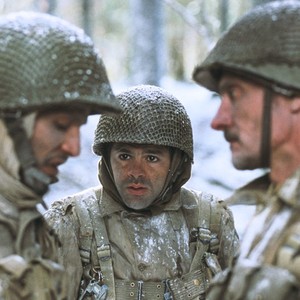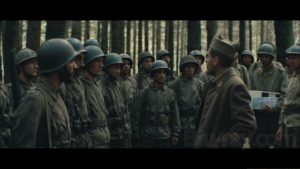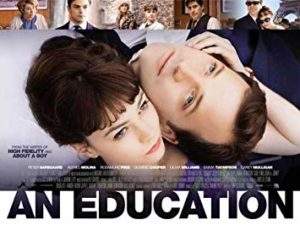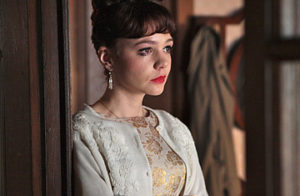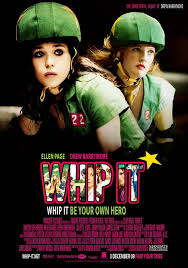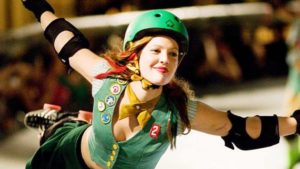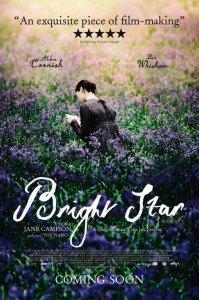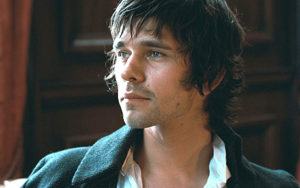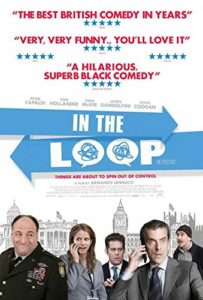From 2005 to 2009 I was a programmer on CKDU 88.1 FM in Halifax, every Sunday morning hosting The Love & Hate Movie Show. I talked about what I was seeing and revisited some of my favourite films of old, pretty much what I do now here on FITI. I still have a lot of the scripts from those days, and thought I should share them here (with some editing and updating) for archival reasons—and just for fun.
I’ve shared a few of these reviews already, starting in August 2015. Here are reviews of the first batch, films that premiered locally at the Atlantic Film Festival, a few horror titles, five-star features , a few disappointments., some charming indies, 13 blockbusters. a few comedies. and thrillers.
As I clear through the last of my vault, here are a few movies that have aged well and would still strongly recommend.
The Dying Gaul
This is a film carries by a cast of American indie royalty: Campbell Scott (Roger Dodger) and Patricia Clarkson (The Station Agent) as well as, for my money, the coolest young actor working today, Peter Sarsgaard. This guy is working non-stop , having been in Kinsey and Garden State last year and in The Skeleton Key this year. Still coming are roles in the Jodie Foster movie Flightplan and Jarhead, the Gulf War drama. I have yet to see him misstep. This guy has both John Malkovich’s danger and the range of a young Nicholson.
The film is, in terms of performances, a tour de force. Adapted from his own play, director Craig Lucas tells the story of a gay screenwriter, Robert (Sarsgaard), his lover having just died, selling his script (called The Dying Gaul) to a big Hollywood studio. The studio wizard, Jeffery (Campbell Scott), is a smooth character. He’s also bisexual, and starts an affair with Robert, though he has a wife, Elaine (Clarkson), and kids at home in a palatial California home. Robert becomes part of their lives, and Elaine, in some effort to perhaps know Robert better, gets access to his diaries and those of his dead lover, impersonating him in internet chat-rooms, leading Robert to believe he’s being communicated to from beyond the grave.
This intrigue, which begins with seemingly good intent, twists into a third act rife with surrealism, Greek Tragedy, and vindictive behaviour by all parties heretofore unsuspected. He who seems most selfish becomes a victim, and those who appear purest of heart turn black.
In some ways it reminds me of Patrick Marber’s Closer, what with the internet playing such a definitive role. It’s such a modern tale in many ways, about personal and artistic compromise. The difference here is that the characters speak less formally and theatrically, at least until the end. I’m still wrestling with the ending, whether it gets a little too over the top, but the journey to it is absolutely compelling. The writing is excellent, certainly, but it’s the performances that really grab you.
Again, Sarsgaard is unbelievable. If this gets the kind of attention Closer got last year, I wouldn’t be surprised to see him recognized at awards season.
Junebug
Junebug is a revelation. It’s a non-judgmental look at a southern American family through the eyes of a sophisticated woman. Not just a sophisticate, but an art dealer, potentially the worst kind of snob. But she’s a loving character, yet naïve enough to not be aware that she has something to learn from these people. The power of faith and community is expressed through the course of the film, and although nothing is explicit, you get the feeling her character understands what might be missing from her life. Not to give you the impression that it’s some kind of rah rah cheerleading picture for the south— throughout the film you see the simplicity, the lack of education, and the bigotry in the culture. But the film is completely without judgement. The audience gets to figure it out for themselves.
The woman is Madeleine, played by Embeth Davidtz, the striking new wife of the prodigal son of the family, George (Alessandro Nivola), the young man who has been away for three years and returned just in time for the birth of his sister-in-law’s baby. There’s some bad blood between him and his brother, and his mother is suspicious of George’s new bride.
This is a movie with a great deal of humour as well, and moments of crazy intimacy. The camera lingers on empty rooms for long seconds before someone walks into the tableau. You really get the sense this is a place where people spend their lives with one another. The movie was shot with a grainy quality, giving it the soft oranges, yellows and browns of a home movie, perfect for the material.
The real heart of the movie is Amy Adams, who plays Ashley, the sister-in-law. She’s an irrepressible optimist who never shuts up. Adams is a joy, giving a completely naturalistic performance. It’s hard to believe her character isn’t out there somewhere right now, living her life and thinking up baby names.
Director Phil Morrison and writer Angus MacLachlan have made a unique, special work here. You’d need to be made of stone to remain unmoved.
State Of Play
After The International and Duplicity, I walked into the third anti-corporate thriller of the year without a whole lot of joy. The cast looked sharp, and I like that the BBC series its based on was adapted by three screenwriters, one of them being Tony Gilroy, super-smart storyteller and director behind Michael Clayton and screenwriter for two of the three Bourne movies. He also was responsible for Duplicity, which I enjoyed, admired maybe, but didn’t love. I wasn’t sure what I was getting with State of Play, especially considering it was helmed by Scotsman Kevin MacDonald, whose directorial background is limited to the very capable but not particularly zippy The Last King of Scotland. Not much about that film would have convinced me he was the right guy for a Washington thriller that stalks the corridors of power and finds time to examine the role of the press while also presenting a genuinely twisty and fun ride. Well, it turns out that’s what he’s done.
Russell Crowe is Cal McAffery, a longtime investigative reporter for the fictional Washington Globe, basically The Washington Post. He’s a little overweight, scruffy, and likes to sing Great Big Sea in his car. One morning while looking into a double homicide, he notices on TV that his old college buddy, Stephen, played by a gaunt Ben Affleck, who is a senator on the Hill, has run into a spot of bother. Stephen’s assistant died in the Washington subway, an apparent suicide, and it comes out that Stephen was having an affair with her. This is a big distraction from the investigation Stephen is mounting into a private defence contractor, shades of Blackwater, that may be responsible for a series of atrocities in Iraq, and may be in bed with the government which might want to privatize a series of domestic and international security needs, if it hasn’t already. Meanwhile, Cal’s editor in chief, the wonderfully brittle Helen Mirren, sics junior reporter/blogger Della Frye, Rachel McAdams, on Cal to get some dirt from him on his old buddy Stephen. Oh, and it turns out that Cal also has a history with Stephens wife, played by the always impressive Robin Wright, pre Netflix’s House of Cards.
Now, I don’t think it will be of any surprise to seasoned watchers of thrillers that the two murders Cal is looking into has something to do with the dead girl in the subway and with the senator. But the fact that there are some familiar twists and turns in this is far from the point. The point is that State of Play is the most satisfying thriller in ages, a movie that moves very quickly and forces the audience to keep up. I would say there are implausibilities, but the picture is pieced together so well, with twists and turns coming so thick and fast, you’re working just to keep up with developments. There really isn’t time to over-analyze anything. And that, my friends, is what makes a satisfying thriller.
I will say, to be a little more critical, that isn’t a lot of character work that leaves any kind of deep mark. But I really like that Cal’s motivations as a journalist are examined with some finesse, that the role of the newspaper reporter is given a little time. His potential conflict of interest issues, his motivations for getting to the truth, for helping his friend, all of it, is handled well. The price he pays for getting his story, the death of civilians that might have been prevented if he’d handed over evidence to the cops earlier, is touched upon, too, but not, unfortunately, really explored very much. Still, any movie that portrays journalism in a positive light these days, I have to give them props for that.
I really enjoyed the sections where Helen Mirren’s character is under pressure from her bosses to report the gossip, and thus pressures Cal and Della to give with what they have, rather than wait for the bigger story to break.
The actors all acquit themselves well. Crowe is as likeable as I’ve ever seen him in a lead. I’m wondering when Rachel McAdams is going to be a real star, because I pretty much fall in love with her every time I see her. She’s amazing. Bit of a stretch to think that Crowe and Affleck are the same age, but I went along with it. Affleck is OK as the senator, but I might have liked to see someone with a little more weight in this role, but the supporting parts are all filled with such great character actors I just got swept into it. Harry Lennix, who wears a suit or a trenchcoat in everything he’s in, does it again here as a police detective. Also, great small parts for Viola Davis, Jeff Daniels, and Jason Bateman, who, of course, gets the most laughs as Dominic Foy.
So, I really enjoyed State of Play, and for its sheer determinism and old school twists, including a nice surprise towards the end, I would say it is an early contender for my Top Ten of 2009 list.
The Girl In The Cafe
This is a film produced by HBO and it has had very little exposure or press, but you can find it now on DVD. It was written by Richard Curtis, the director and writer of Love, Actually, as well as the writer of Four Weddings and a Funeral, Notting Hill, and co-writer of the classic British TV series Blackadder. This isn’t a story you’d likely see on the big screen, it’s almost too intimate, with a real political bent.
Bill Nighy, the grizzled British character actor who was so good as the rock star with the Christmas single in Love, Actually, he plays a finance wizard working for the British Chancellor of the Exchequer. He’s a slave to his work, and has precious few social skills. In a café he meets a young woman played by Kelly MacDonald, the charming actress from Trainspotting and more recently, Gosford Park and Finding Neverland. She’s also a bit frumpy and introverted. The two somehow overcome their natural shyness to make a date, and quickly become friends. He’s due to be part of the British delegation to a G8 summit in Iceland, and on a whim he invites his new friend, not knowing very much about her past or her political inclinations.
What we have is Curtis’ knack with dialogue, with the space between people when they are falling in love. Even in a scenario as unlikely as this, his words ring true, as do the characters. Things happen in Iceland that seem particularly implausible given the extreme security at these events, and the fact that the British government is painted as the force for change in aid to Africa is also a bit of a stretch. That said, the relationship between Nighy’s and MacDonald’s characters stayed with me long after the film was done. The picture is very much worth seeing for their romance, which may be one of the best in movies this year.
Omagh
This is a film written and produced by Bloody Sunday and The Bourne Supremacy director Paul Greengrass. Directed by Pete Travis, this is a taut political thriller, and should not be missed.
The movie is about the day of and the events following the August 15th bombing of the Northern Ireland town of Omagh by a group called the Real IRA. It was a splinter organization that resisted the steps the other IRA, the main body, were taking to bring peace to the two countries. The story is told largely on the shoulders of one man and his family, a soft-spoken mechanic who gets involved in pursuing the bombers after the tragedy, almost despite himself.
It’s hard to believe this movie was originally made for television in Europe—if something this powerful and political showed up on TV here, well, it probably wouldn’t. The opening thirty minutes are all about the day, immediately before the explosion and immediately after, and the tension is a tactile thing, created using editing and the desperate performances of a top-notch cast. What strikes as so amazing is there is no music. No swelling strings, no feverish woodwinds, just silence, voices, and an amazing sound editing that makes the street noise feel like it’s all around. The familiarity of the Irish people and their day-to-day lives is also affecting. If it weren’t for the smaller cars on the left side of the road, and the accents, the town could be small town Nova Scotia. It doesn’t seem so far away.
Some of the air goes out of the movie after the virtuoso opening, but then, it would have to. The aftermath of the bombing and its long term effects become a human story of community and perseverance. The hypocrisy of the peace process is also revealed, as the movie shows that deals made in political backrooms in Dublin or Belfast rarely serve the needs of justice or the suffering of the victims. Omagh is a solid political drama, but the authenticity of the direction and sense of people and place makes it feel like more of a historical document.
Two Lovers
If it weren’t for the contemporary fashions and actors, I might have believed Two Lovers was made in 1977. It has all the hallmarks of a serious drama from the 1970s, with no other genre tropes. It is a drama and a romance, and that is it.
Two Lovers is co-written and directed by James Gray, known for his tough urban movies such as The Yards and We Own The Night—and in years since, The Lost City Of Z and Ad Astra. Here his movie is set in the Brooklyn fall and winter, a melange of grey and brown and beige. Leonard (Joaquin Phoenix) is a man tormented: when we meet him he’s half-heartedly trying to kill himself. He was engaged to be married, but in his Jewish community where children often live at home for years if they remain single, the parents of his fiancé objected to the match, and convinced her to dump him. So he lives at home, depressed, with his old posters on the wall, a neurotic but charming guy able to be funny and joke with people, a great dancer, but so awkward it’s painful to watch.
His parents sort of set him up with Sandra (Vinessa Shaw), the beautiful daughter of one of their friends. She seems more interested in him than he is in her. She is a kind and considerate, she sees his torment, she understands what he’s about, and wants to take care of him. There’s a scene where she confesses as much, and you can’t help but want to yell at the screen, “Leonard, don’t let her go!”
Unfortunately, the heart will sometimes lead us to strange places. Leonard becomes obsessed with a legal assistant who lives in his building, Michelle (Gwyneth Paltrow). She’s a woman with a problem or two, not the least of which is she is seeing a married man. But Leonard is nurturing, and she enjoys the attention he gives while he interprets her sweetness as attraction.
So, the story is about how Leonard is torn between these two women in his life, how his damaged, anti-depressant-taking self tries to find real love a second time. Phoenix is so entirely convincing as the twitchy Leonard, it’s hard to imagine him as playing anything else. In fact he’s played plenty of twitchy, obsessed characters since—it’s his stock and trade—most recently in Joker. The supporting cast is great too, especially Isabella Rossellini as Leonard’s mother.
This is a hard movie to get through—it’s a hard watch. It’s a discomfiting experience, watching Leonard deal with his troubles, making decisions that you know will just lead him to repeating the mistakes he made in the past. The tone of the picture is anxiety producing, but ultimately it is a film to see, it will make you think about your own decisions and how difficult it is for some of us to know what’s right for us, what will make us happy in the long run, versus the kind of glamour that burns hot but in fact is very fleeting.
Days Of Glory
Set in Algeria and Europe in the Second World War, Days Of Glory is directed by Rachid Bouchareb. It’s a war movie, and all that entails, very much in the style of recent dramas set in that era, including, and especially, Saving Private Ryan. It ends very similarly to that film, with a small group of soldiers trying to hold a bridge, and a cemetery coda in the present day. I
In some ways, though, Days of Glory is a better film than Ryan, and more moving and more involving than either Flags Of Our Fathers or Letters From Iwo Jima, partly because it is entirely free from any American jingoism or sentiment, the self-satisfaction that is always present in Hollywood movies about war, even ones as stolid and serious as Eastwood’s. What Days Of Glory has going for it as real political point that should impact anyone who knows anything about what France is dealing with right now, the controversy around immigration and colonialism.
Days of Glory starts in Algiers in 1943, with a group of men signing up to help the “motherland.” France, fight off the Nazis. It doesn’t take long for a few of them to bond, and for one to become a Corporal, though he realizes as he goes along he’ll not rise any higher in the ranks because he’s an Arab. The soldiers fight their way through Italy and into France, seeing a lot of combat, but also the gratitude of the people in French villages. We see the struggles the Arab soldiers have, denied the rights of French soldiers, through the censorship of their letters and the denial of the same food the other soldiers eat, not to mention the black Africans, who seem even more segregated. The corporal is a born leader, and convinces the others that if they excel and fight like warriors, they’ll get the respect they deserve. Fans of Amelie will recognize in the cast Jamel Debouzze, who played the put-upon fruit-stand kid. Lucien.
The film is well shot, well written and very well acted. As it goes along it focuses on its message from an Algerian filmmaker to the French authorities, setting history straight as well as reminding anyone living now that France has Algeria at least in part to thank for its freedom from German oppression.
An Education
Jenny (Carey Mulligan, a delight) is a 16-year-old in pre-Beatles suburban London, the cleverest one in her class and a good grade in Latin away from going to Oxford for university. She meets older man David (Peter Sarsgaard, here with more charm than smarm) who sweeps her off her feet, offering nights out, glamorous events, dinners and even trips to Paris. David even succeeds in impressing Jenny’s parents (Alfred Molina, in permanent bluster mode, and Cara Seymour) but dowdy English teacher Miss Stubbs (Olivia Williams, whose bad specs are a sad effort to hide her glamour) doesn’t want Jenny to give up her dreams of proper school for an ill-advised dalliance. Props to Rosamund Pike who brings to life the wonderful but none-to-bright supporting character, Helen.
Thematically, this film is nothing new, but a real verve in the direction (by former Danish Dogma director, Lone Scherfig) and Nick Hornby’s script, adapting a memoir by Lynn Barber, makes for a solid, classy, and crowd-pleasing film, bringing London in the ’60s to life just as it begins to swing. This is a movie that everyone I’ve spoken to has had a pretty strong emotional reaction to, with some identifying the David character as a predator, which is what he is. I don’t think the film excuses this, but it tells a story in a particular time and place, when men could get away with this kind of behaviour with even more freedom than now. I found a few elements in the end are wrapped up a little too neatly, but it’s a thoughtful and interesting script and well-acted, with a star-making turn from Mulligan.
Whip It
For a first feature, Drew Barrymore needs to be given some serious props. She delivered a hugely entertaining and heartfelt film. Ellen Page is Bliss Cavendar, a Texas teen who has been winning beauty contests for years, primped and propped up by her mother. It’s credit to Marcia Gay Harden that we as an audience have any sympathy for the mother at all, because she could easily have been a caricature of all that’s hateful, but all the characters on screen emerge fully formed.
Even the erstwhile villain, Juliette Lewis’s Iron Maven, has a code of ethics that comes clear in the end. Bliss gets hooked up with the local roller derby league, to the chagrin of her family and close friends. What really impresses is Barrymore’s actors really learned how to skate, and the scenes in the rink are exciting and believable, and never edited so tightly that you can’t see what’s going on. Whip It isn’t life changing, but it solidified Ellen Page as someone who can carry a mainstream entertainment—she’s hugely appealing in this.
Bright Star
Ben Whishaw is an expert in channelling the sensitive artistic sort in his roles, from Perfume to Brideshead Revisited. Here he reaches an apex of frail creativity as John Keats, who I knew little about before strolling into the cinema. The crux is he was a romantic poet who died young very young. That’s about it, and that’s all you really need to know.
Campion saw some success in the ‘90s with weepy period dramas such as The Piano and The Portrait of a Lady and here plays to her strengths. Bright Star a beautiful film illustrating the slow burn love between Keats and Hampstead fashion plate Fanny Brawne, played with subtle aplomb by Abbie Cornish. The delicious use of light in both the interior and exterior scenes enthrals. The film knows that its leads’ emotional rawness sometimes crosses over to the melodramatic, but it allows the audience that knowledge without sacrificing the performers’ authenticity or a fraction of wit in the script. I was a blubbering puppy at the end of this one— Bright Star is easily one of the best movies of the year.
In The Loop
I can’t remember the last time I laughed so consistently and heartily at an independent comedy. This film was directed by Armando Iannucci (later to have much success with Veep and The Death of Stalin) and stars Brits Peter Capaldi, Tom Hollander, and Gina McKee, and Americans James Gandolfini and Anna Chlumsky, who I remember as a child actress in the My Girl movies.
In The Loop is based on a British TV series called The Thick of It, created by Iannucci. The film, shot with hand-held cameras, does have a bit of the British TV aesthetic that The Office did so well, but what really shines here is the brilliant script about a British cabinet minister (Hollander) who is a little over his head, making comments to the press he shouldn’t have made, angering the governmental communications officer (Capaldi), Despite this, Hollander’s character gets sent to the US to participate in some kind of committee and oppose what appears to be a march by the Americans to war in the Middle East. Also a big part of the story are the assistants, vying for power amongst each other they inadvertently make matters worse. It’s a refreshingly foul-mouthed film, I thought, and maybe the best political satire I’ve seen from the Brits since Yes, Minister. I’m going to have to track down the TV show to see if it’s anywhere near as funny as the film.





